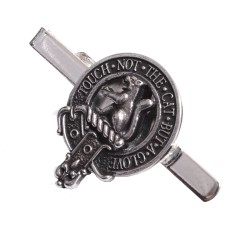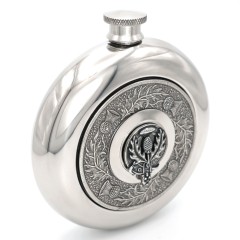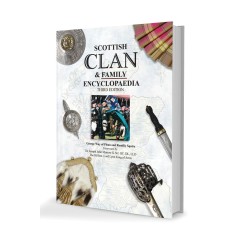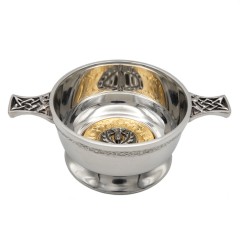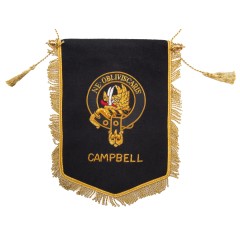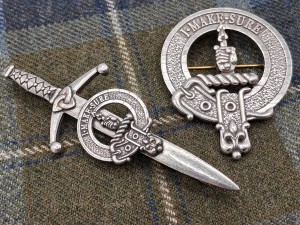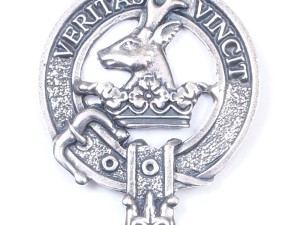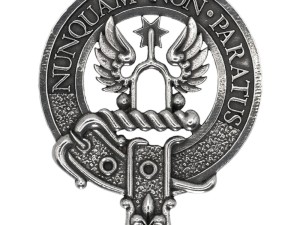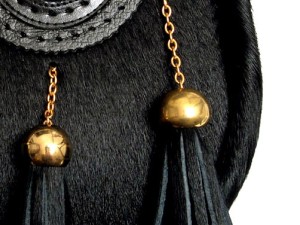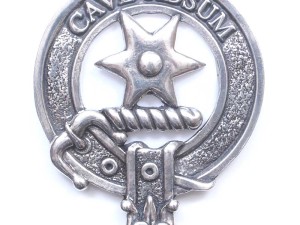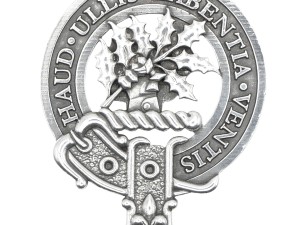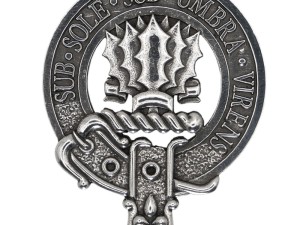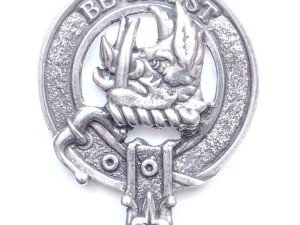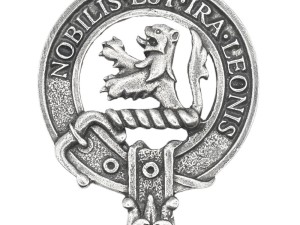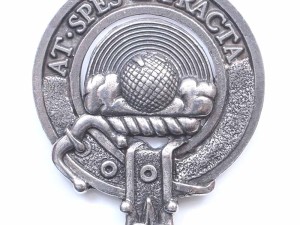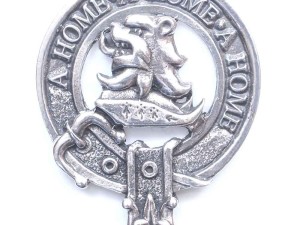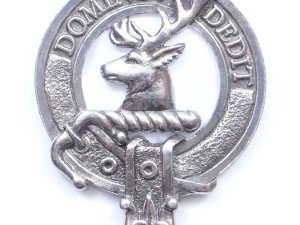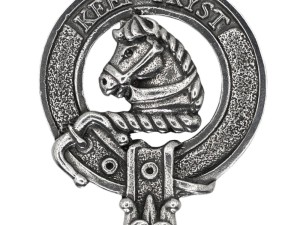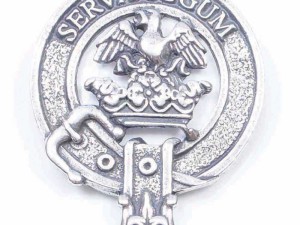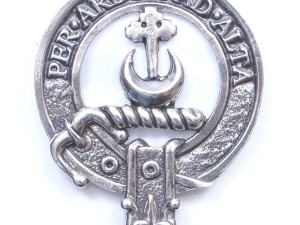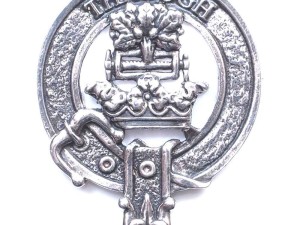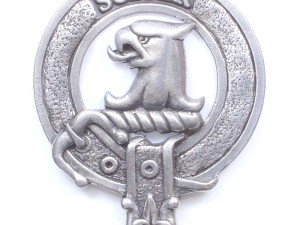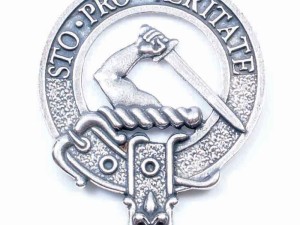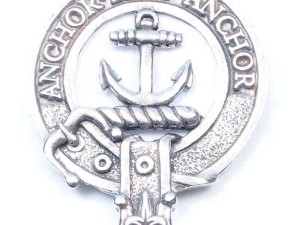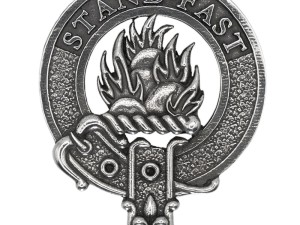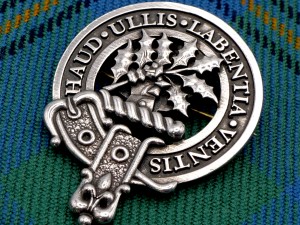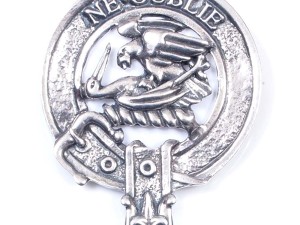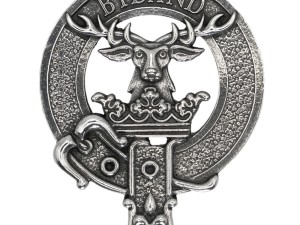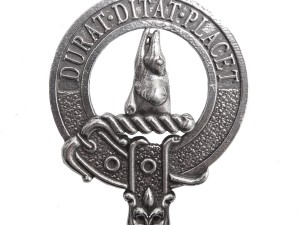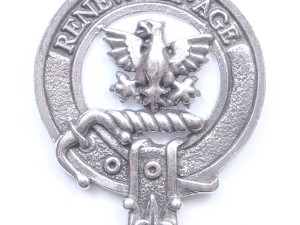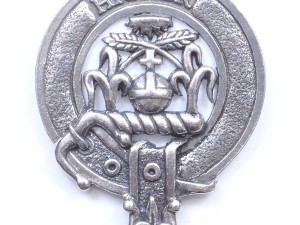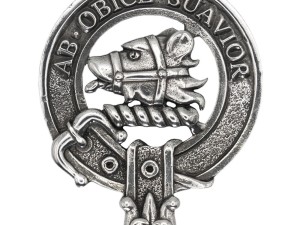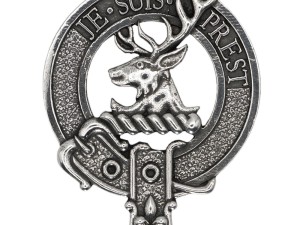0
9
If people ask us the reason why the classic tartan Kilt has remained more or less unchanged for over a century, we always provide the same answer. It was never intended to be a mere fashion statement, to come and go like any other garment. Kilts can be passed down the generations. A well-made traditional tartan kilt was designed to fulfil a particu..
0
89
New clan now available on the website: KIRKPATRICK
We’re pleased to add Clan Kirkpatrick to the website, a name bound up with one of the most dramatic and decisive moments in Scottish history. The clan badge bears a bloody dagger and the stark motto “I mak sikkar” — usually rendered in modern English as “I make sure.” Both refer to Sir Roger (or Ro..
0
34
The crest of the chief of the powerful Keith kindred, once
the Earls Marischal and now the Earls of Kintore, is a gold coronet with a
roebuck’s head, with the motto ‘Veritas Vincit’. The roebuck had not always been the Keiths crest, as a lamb is
shown on the 1369 armorial del Gelre. (R.R. Stodart, Scottish Arms being a
Collection of Armorial Bearin..
0
287
The crest of the chief of the Johnstones is a winged spur,
accompanied by the motto “nunquam non paratus” (“never unprepared”). The
symbolism is direct and effective. The Johnstones were a proud Borders
kin-group, renowned for horsemanship and mounted warfare, and the spur is an
unmistakable emblem of the mounted rider. The addition of wings intens..
0
328
If dancing at your ceilidh gets a bit out of hand and you
loose one of your sporran tassels, it’s fortunate we can provide replacements.
Most tassels are held on the inside of your sporran by a split ring (like the
sort you use on a key ring), so its not only easy to remove and replace, but by
adjusting where the ring sits on the chain you can make..
0
128
The Jardine crest is a spur rowel of six points—the star-shaped wheel attached to the back of a horseman’s spur. As a heraldic charge it is both martial and kinetic, evoking speed, control, and the intimate relationship between rider and horse. Accompanying it is the succinct and rather threatening motto Cave adsum, meaning “beware, I am present”, ..
0
192
Just as the Irvings of the Borders are related to but
distinct from the north eastern Irvines, so too is their heraldry. Like the
Irvines we see the holly leaves, canting (visually punning) on the ‘vine/ving’
element of the name, but deliberately selecting a spiky and resilient plant,
reflecting the qualities the families which to associate themsel..
0
165
The crest of the chief of Irvine is a sheaf of holly leaves,
bound by a red ribbon. At its core this crest is ‘canting’, meaning it’s a
visual pun on the ‘vine’ in the name. That the leaves are bound together
represents the various branches of the family held together under the chiefs. Although
the chiefs could have chosen other native vines, such ..
0
165
The crest of the chief of Innes is a boar’s head with the
motto ‘Be Traist’, meaning something like ‘be faithful’ or ‘keep faith’,
essentially encouraging the bearer to stand firm. The name Innes comes from the
Gaelic word for Island. James Innes of that Ilk had quartered his shield with three
boars heads (along side the Inneses’ traditional three ..
0
147
The Inglis crest is a silver demi lion, with the motto 'Nobilis
est ira leonis'. Lions have long been associated with the Kings of Scotland and
the kingdom, so we find it repeatedly used by major Scottish families. The motto is riffing on the bible passage: Proverbs 19:12
(Vulgate): Sicut fremitus leonis, ita et ira regis – “The king’s wrath is lik..
0
219
The chief of the Hopes bears one of the more distinctive and
evocative crests in Scottish heraldry. It depicts a broken globe, flanked by
clouds from which a rainbow spreads across the sky. Accompanied by the Latin
motto At Spes Infracta—translated as “But Hope is Unbroken”—the imagery
is both symbolic and carefully chosen. The rainbow, a longstand..
0
150
The first Lord Home, who died in 1491 had the crest of a doe
head as part of his arms. And this was carried through the next four Lord
Homes, the fifth died in 1575. The sixth Lord Home changed it to a lion’s head
by 1591. After he was made first Earl of Home, he seems to have added the motto
‘Treu to the end’ (Willam Rae MacDonald, Scottish Armor..
0
158
The Herries crest is a stag’s head with specifically ten
tynes. The motto is ‘Dominus Dedit’, the Lord has given. Sadly, the hedgehog on
their shield didn’t make it to the crest. Both stag and motto appear in the Workman heraldic
manuscript of the 1560s, although a contemporary manuscript has an alternive
motto ‘Durum patientia frango’ which transl..
0
451
The Hepburn crest is a bridled horses head and the motto ‘Keep
Tryst’, essentially meaning keep faith. The story behind this crest is probably that Adam de
Hibburne in the late 13th or early 14th century saved the
Earl of Dunbar from an attack by a wild stallion. In thanks the earl gave Adam
lands in East Lothian. The story that first appears in He..
0
392
The Hay crest features a crown with a belled hunting falcon,
with the motto ‘serva jugum’, meaning ‘Keep the Yoke’.Both refers to a story that first appears in Hector Boece’s Historia Gentis Scotorum, the History of Scotland, of 1527. Boece recounts the story
of the battle of Loncarty in 990, in which King Kenneth was fighting Danish
Vikings. The b..
0
239
The Hannay crest is a ‘cross crosslet fitchee’ standing on a
black crescent.A cross crosslet fitchee is like a cross with small crosses
at the ends of each arm and a pointed bottom arm. This symbolises a devout,
steadfast Christianity, the mini crosses suggest the spreading of the message,
while the pointed base suggests groundedness or readiness t..
0
512
A unique crest for the Hamiltons, featuring a ducal crown
and an oak tree being cut down by a long saw. The crown simply refers to the chiefs
status in the peerage. Through here means something like ‘timber’ does for modern
woodcutters. G. Harvey Johnston’s The Heraldry of the Hamiltons of 1909 gives this account:“The story runs that "Sir Gilbert d..
0
337
The Haldane crest is an eagle’s head with the motto ‘suffer’,
and it has a good pedigree. In the Workman’s Manuscript of 1565-6 the arms of Haldane of
Gleneagles are shown with two eagle or falcon supporters and the motto ‘suffer,
suffer’, although there was no crest yet at this time ((R.R. Stoddart, Scottish
Arms being a Collection of Armorial Bea..
0
252
Our Haig Crest, based on the artwork of Romilly Squire. The crest of the chief of the Haigs is a Rock with the motto
‘Tyde What May’.The rock and ‘tyde what may motto’ were recorded for Haig of
Bemerside in Nisbet’s 1720s System of Heraldry, although there was an
additional motto ‘Sola Vitus Invicta’. They were not recorded in Sir George
MacKenzie’..
0
502
The crest of the chief of Guthrie is an arm holding a sword,
with the motto ‘Sto pro veritate’.Guthrie of that Ilk does not appear in Nisbet’s System of
Heraldry of the 1720s, indicating that they hadn’t got their arms registered by
that time. Sir Henry Guthrie of Kingsedward had, however, although his crest
was a lion’s paw holding a palm tree, bu..
0
420
A fetterlock with the motto ‘Hoc Securicor’. This crest was
registered in the 1680s by Grierson of Lag in Nithsdale. Fetter means chain, so
these were locks designed for holding people. Fetterlocks are essentially hand
or leg cuffs. Hoc Securicor just means ‘more secure with this’, so is just
reinforcing the lock imagery. The Grierson seal in 1418 ..
0
832
The crest of the Grays is an anchor with the motto ‘Anchor
Fast Anchor’. In the fifteenth century the crest of Andrew Gray of
Boxmouth was a swan’s head issuing from a coronet, which was recorded in 1424.
This was in turn used by his son, Andrew, the first Lord Grey. It is only in
the Workman Manuscript of the 1560s we see the crest of Lord Gray de..
0
762
Our Grant Cap BadgeAlthough the chiefs of Grant have arms recorded back into
the sixteenth century, the first record of their crest came when the arms were
registered between 1672 and 1678 – these were a burning hill, with the motto
‘stand sure’. This was still the case at the time of Nisbett’s System of
Heraldry in the 1720s and the 1750 ‘A Brief ..
0
513
We are delighted to announce the addition of a distinguished new kindred to our range: Irving of Bonshaw. Well, new in the sense that while the crest is new to our collection, the Irving family’s proud heritage stretches far back to the twelfth century, with a rich history rooted in the Scottish Borders.The late Romilly Squire, a renowned heraldic ..
0
1242
The Graham crest is one of the more unique in Scottish
heraldry. Here we have a falcon killing a stork, with the French motto ‘Ne
Oublie’ – do not forget. Unfortunately, the exact event the falcon and stork
are referring to has, it seems, been forgotten. Through the thirteenth and fourteenth century the Grahams
favoured escallops and boars’ heads f..
0
1766
The Gordon crest features a striking stag’s head with a
piercing, thousand-yard stare. Set within a coronet, the stag is distinguished
by five tines on each antler—likely a deliberate and symbolic detail. The
accompanying motto is Bydand, derived from the Scots word bide or
byde. This is ‘biding’ in English, as in biding one’s time, so this
means “..
0
583
The Geds take their surname from a placename, but the name
is also a Scots word for a pike—a long, sharp-toothed freshwater fish. This
dual meaning is reflected in the heraldry associated with the family, where
pike often appear as charges, notably in the arms of the Geds and their close
kin, the Geddes family. This practice of visually representin..
0
581
The crest of the Laird of Gartshore features an eagle displayed,
a heraldic term meaning the eagle is shown with its wings fully outstretched
and its head held high. This commanding pose, coupled with the family motto “I
renew my age,” gives the crest a sense of nobility and spiritual vitality,
especially striking for a lairdly, rather than noble o..
0
1027
Here we have an unusual heraldic composition: a royal orb
positioned beneath the radiant rays of the sun, flanked on either side by two
crossed ears of corn, accompanied by the succinct but aspirational motto,
"Higher."In heraldry, the royal orb is traditionally and rather
inelegantly referred to as a “mound.” This term derives from a corruption of..
0
1100
The crest of the Galbraith family features a distinctive
muzzled bear’s head, accompanied by the Latin motto “As Obice Suavior.”
Translated from French, this phrase means “Gentler because of the obstruction,”
implying that the bear has been tamed due to the presence of the muzzle. This
symbolism suggests not only strength and ferocity restrained by..
0
1717
The Highland branch of the Fraser family is historically
represented by a distinctive and meaningful heraldic symbol: a buck’s head
accompanied by the motto "Je Suis Prest," which translates
from French to "I am ready." This emblem is rich in both
symbolism and historical evolution. In heraldry, a deer’s head is often used to
signify noble qualitie..
0
2336
We’re back to visual punning (‘canting’) with the Fraser crest. ‘Fraise’ in French means strawberry, so this one is quite on the nose in terms of symbolism - a strawberry plant. The crest was devised by the Lords Fraser sometime in the seventeenth century, possibly when they were elevated to the peerage. The title Lord Fraser had been created by Ch..
0
2462
Another griffon! Unlike Forsyth with its blue griffon, this
one is ‘proper’ in the heraldic blazon, meaning it should be coloured in its
natural colours. I’ve not seen one in the wild, but tradition is griffons
should be shown gold. The motto is ‘be it fast’, (in other words, let it be
fast). There’s suspicious parallel with the Leslie crest w..
0
6507
This surname has various spellings, Smith being the most
common, but also Smythe, Smyt, Smit, and Gow (being the Gaelic), Gowan, MacGow
and MacGowan. It’s an occupational surname, referring to someone who works
metal, and mostly refers as shorthand specifically to a blacksmith, someone who
works in iron or steel. Being such an important and widespr..
0
2768
A blue griffon with black talons and beak and a gold crown on
its head. James Coat’s 1725 Dictionary of Heraldry says that
griffons were used ‘to express strength and swiftness join'd together, and
extraordinary Vigilancy to preserve things they are entrusted with’.Blue crowned Griffons had been used on the shield of Forsyth
of Forsyth since at..
0
3393
The Forrester crest is a hound’s head with collar, with the
motto ‘blaw hunter blaw thy horn’. This comes from the Lords Forrester of
Corstorphine. This was more or less the crest of Forrester recorded in the
Workman Manuscript of 1565-6 (spelled there ‘Foster’), which had the motto
‘Hunter bla vy horn’. The arms of Lord Forrester included thre..
0
3946
The Forbes Crest is a stag’s head with ten tynes on its
antlers, and that specific formulation has been in place since at least the 1670s
and is described in Sir George Mackenzie’s ‘Families of Scotland manuscript’.
It was registered in the Lyon office at that time. Like we saw with Colquhoun and Davidson (and with more to
follow) stags tend to..
0
4456
The Fleming crest, originating with the Fleming’s of Biggar,
consists of a goat’s head and the motto ‘Let the Deed Shaw’. Both motto and
crest were recorded in the Workman’s Manuscript of 1565-6 for Lord Fleming. The
goats head appears as early 1392 (Willam Rae MacDonald, Scottish Armorial
Seals, 1904, 116). The goats head is rare in Scottish heral..
0
2647
The Fergusson crest features a bee
on a thistle on a chapeau (hat) lined with ermine. It dates, minus the cap, to just before 1722 and was registered with the Lyon Office by Sir John Fergusson of
Kilkerran.The Fergusson Arms shown in Nisbet's System of Heraldry of 1722
Obviously, the thistle is a symbol of Scotland, and had been
for many centurie..
0
9196
Sadly there isn’t one, as MacKinlay wasn’t a fully fledged clan/kindred by the usual metrics, instead being powerful followers of larger kin groups.
As such, there were important MacKinlay septs of four larger clans, Buchanan
for those east of Loch Lomond, MacFarlane for those north of Loch Lomond,
Farquahrson for those in Aberdeenshire and the nor..
Showing 1 to 40 of 40 (1 Pages)



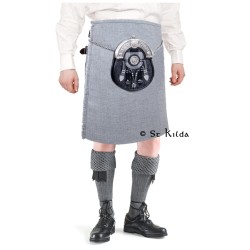





















-240x240w.jpg)

















